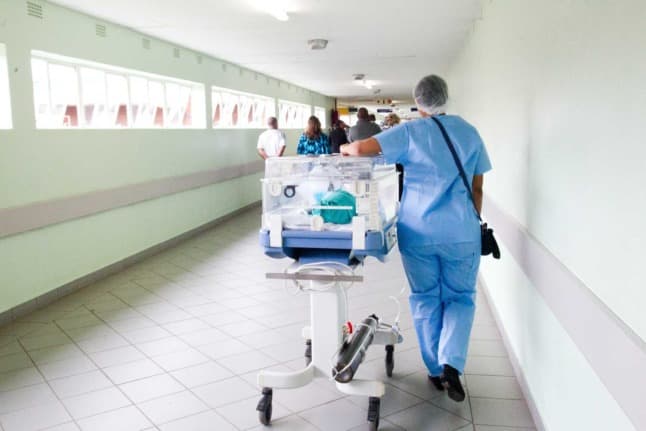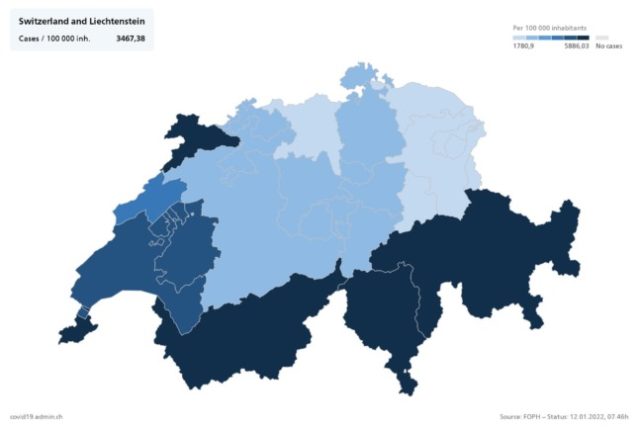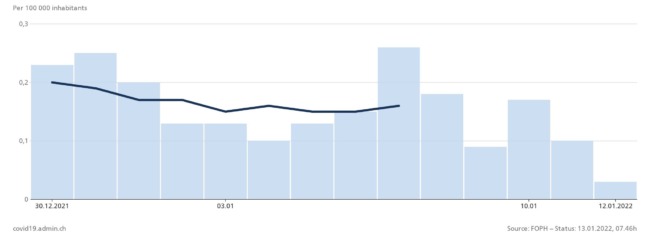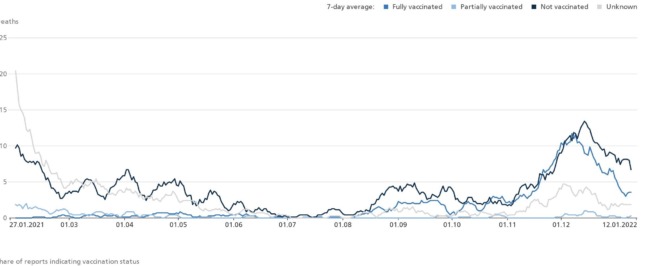Covid hotspots: 'More hospitalisations' predicted for Switzerland’s as cases increase

The epidemiological situation in Switzerland is not improving — the number of infections continues to be extremely high, though hospital admissions have remained relatively stable. However, that is likely to change soon, experts predict.
The number of contaminations continues to soar, with 29,887 new cases reported on January 13th. Experts believe that most of these infections are due to the Omicron variant, which now accounts for 76 percent of cases in Switzerland.
The national infection rate now stands at 3,592.52 per 100,000 people, over one thousand more than last week.
Most infections, according to the Federal Office of Public Health (FOPH) have been detected in Valais (6,024.05 / 100,000), followed by Geneva (5,979.15), Jura (5,829.68), Graubünden (5,753.74), and Ticino (5,321.01).
Cases in Vaud (5,025.03), Fribourg (5,019.72), and Neuchâtel (4,555.58) also exceed the national average.
On the other hand, the situation is eastern, central and northern cantons has gotten better.

Southern and western cantons are most affected. Image: FOPH
Perhaps the best indicator of the extent of infections is that nearly 163,000 people are now in isolation in Switzerland, having tested positive for the virus.
READ MORE: Switzerland to cut quarantine period for vaccinated and extend current measures
Meanwhile, the situation in hospitals has improved slightly, with 267 coronavirus patients currently in intensive care units — down from 306 last week.
However, occupancy rates will likely go up, health officials say.
“It's very possible that we will reach the peak of the wave within one to three weeks. The FOPH expects an increase in the number of hospitalisations in the coming days”, according to Tanja Stadler, president of the Covid-19 Task Force.
Virginie Masserey, head of FOPH’s infection control unit, reiterated that “there is a lag between the time of infections and the time of hospitalisation. It is often 14 days. It is during the next two weeks that we will begin to see the consequences” of the Omicron contagion, she pointed out.
If this forecast is realised, authorities would quickly implement additional restrictions
“Should the situation in hospitals deteriorate significantly, the Federal Council can still act swiftly by imposing stricter measures such as the closure of facilities and institutions or by limiting capacity at large-scale events,” the government said in a press release on Wednesday.
What about deaths?
Like hospitalisations, death rates continue to decline — from 122 in the week starting on December 27th to 91 in the week beginning on January 3rd.

Fewer deaths have been recorded. Image: FOPH
FOPH attributes the relatively low numbers to vaccinations.

Death rates are lowest among fully vaccinated people. Image: FOPH
What’s ahead?
While it is difficult to accurately predict how the epidemiological situation will continue to evolve, a number of health experts have said the end of the pandemic may be near.
“We are perhaps on the brink of an important, even decisive, turning point, with the passage from a pandemic phase to an endemic phase”, said Health Minister Alain Berset.
He attributed this to “the immunity rate of the population which has now exceeded 90 percent in all age groups over 20 years old” because of vaccination or infection.
And according to Rudolf Hauri from the Conference of Cantonal Health Directors, “we will overcome most of the pandemic by the spring, as the baseline immunity will be high enough”.
READ MORE: Swiss government: Omicron may be ‘beginning of the end’ of pandemic
Comments
See Also
The number of contaminations continues to soar, with 29,887 new cases reported on January 13th. Experts believe that most of these infections are due to the Omicron variant, which now accounts for 76 percent of cases in Switzerland.
The national infection rate now stands at 3,592.52 per 100,000 people, over one thousand more than last week.
Most infections, according to the Federal Office of Public Health (FOPH) have been detected in Valais (6,024.05 / 100,000), followed by Geneva (5,979.15), Jura (5,829.68), Graubünden (5,753.74), and Ticino (5,321.01).
Cases in Vaud (5,025.03), Fribourg (5,019.72), and Neuchâtel (4,555.58) also exceed the national average.
On the other hand, the situation is eastern, central and northern cantons has gotten better.

Southern and western cantons are most affected. Image: FOPH
Perhaps the best indicator of the extent of infections is that nearly 163,000 people are now in isolation in Switzerland, having tested positive for the virus.
READ MORE: Switzerland to cut quarantine period for vaccinated and extend current measures
Meanwhile, the situation in hospitals has improved slightly, with 267 coronavirus patients currently in intensive care units — down from 306 last week.
However, occupancy rates will likely go up, health officials say.
“It's very possible that we will reach the peak of the wave within one to three weeks. The FOPH expects an increase in the number of hospitalisations in the coming days”, according to Tanja Stadler, president of the Covid-19 Task Force.
Virginie Masserey, head of FOPH’s infection control unit, reiterated that “there is a lag between the time of infections and the time of hospitalisation. It is often 14 days. It is during the next two weeks that we will begin to see the consequences” of the Omicron contagion, she pointed out.
If this forecast is realised, authorities would quickly implement additional restrictions
“Should the situation in hospitals deteriorate significantly, the Federal Council can still act swiftly by imposing stricter measures such as the closure of facilities and institutions or by limiting capacity at large-scale events,” the government said in a press release on Wednesday.
What about deaths?
Like hospitalisations, death rates continue to decline — from 122 in the week starting on December 27th to 91 in the week beginning on January 3rd.

Fewer deaths have been recorded. Image: FOPH
FOPH attributes the relatively low numbers to vaccinations.

Death rates are lowest among fully vaccinated people. Image: FOPH
What’s ahead?
While it is difficult to accurately predict how the epidemiological situation will continue to evolve, a number of health experts have said the end of the pandemic may be near.
“We are perhaps on the brink of an important, even decisive, turning point, with the passage from a pandemic phase to an endemic phase”, said Health Minister Alain Berset.
He attributed this to “the immunity rate of the population which has now exceeded 90 percent in all age groups over 20 years old” because of vaccination or infection.
And according to Rudolf Hauri from the Conference of Cantonal Health Directors, “we will overcome most of the pandemic by the spring, as the baseline immunity will be high enough”.
READ MORE: Swiss government: Omicron may be ‘beginning of the end’ of pandemic
Join the conversation in our comments section below. Share your own views and experience and if you have a question or suggestion for our journalists then email us at [email protected].
Please keep comments civil, constructive and on topic – and make sure to read our terms of use before getting involved.
Please log in here to leave a comment.